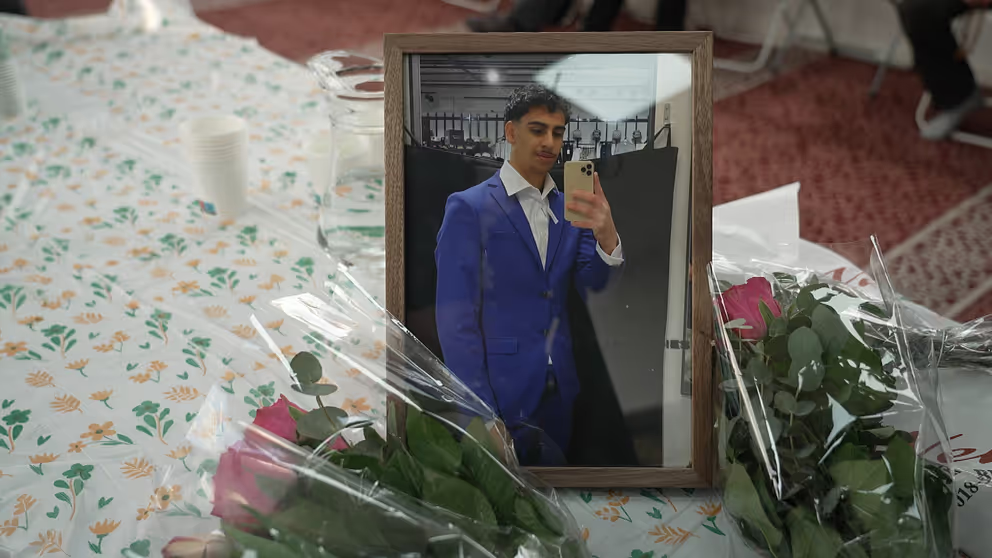The city of Uppsala is in mourning after a triple homicide on Tuesday, April 29, left three young men dead inside a hair salon near Vaksala torg, a busy central district. Among the victims was 15-year-old Aiham, a boy described by friends and family as “kind, respectful and full of dreams.”
Police were alerted just after 5 PM by reports of gunfire. Upon arrival, they discovered three victims aged between 15 and 20, shot dead inside the salon. According to the prosecutor, the shooter appeared to have intended to kill, though it remains unclear whether all three were deliberate targets.
Victims remembered: “He kissed his mother goodbye”
The tragedy has sparked an emotional outpouring. Aiham’s family and friends gathered at Uppsala moské in Kapellgärdet for a memorial service attended by hundreds. The mosque’s chairman, Yaser Abu Jheisheh, described Aiham as “a joyful boy who spread smiles.” His father, still devastated, told Swedish media: “He kissed his mother on the head before school and told her he loved her.”
Aiham had just landed his first part-time job, working only one day before his death. On Tuesday, he had asked his father to Swish (a mobile payment common in Sweden) him money for a haircut in preparation for Valborg, a major Swedish spring celebration.

Investigations ongoing: multiple arrests and potential gang links
Police have arrested four suspects: a man in his 20s on probable cause for murder, and three others aged 25, 35, and 45, suspected of instigating the murders. A 16-year-old boy initially arrested has been released and is no longer a suspect. Prosecutors must decide by Sunday and Monday whether to seek pre-trial detention for the remaining suspects.
Authorities are also examining possible links to organized crime. One of the victims was reportedly involved in an earlier investigation tied to gang leader Ismail Abdo, but no firm conclusions have been drawn. Law enforcement has launched a special operation, deploying extra resources to prevent possible retaliatory attacks.

Fear spreads among residents
The killings have deepened public concerns about youth safety and the spread of gun violence in Sweden. Speaking to Aftonbladet, Aiham’s father lamented: “This country is going to hell. It’s a catastrophe.”
Outside the salon, a makeshift memorial with flowers and candles grows daily. Young football teammates have dedicated their match jerseys to Aiham, bearing his name as a tribute.
A broader context of rising violence
Sweden has in recent years witnessed a dramatic rise in fatal shootings, disproportionately affecting young men in disadvantaged neighborhoods. According to official statistics from the Swedish National Council for Crime Prevention (Brå), Sweden has the highest rate of gun homicides in Europe. The trend has been linked to escalating gang conflicts, easy access to firearms, and a growing market for illicit drugs.
This is not the first time a Scandinavian city has been rocked by youth violence. As previously reported by NordiskPost, recent shootings in Stockholm’s southern suburbs and a spate of bombings in Malmö have drawn attention to what experts describe as a new form of urban insecurity. In 2024 alone, over 60 people were killed in gun-related incidents across the country.
Authorities have responded with increased surveillance, anti-gang initiatives, and legislative proposals, including expanded police powers and stricter arms control. However, critics argue that more needs to be done to address root causes such as segregation, unemployment, and school dropouts.
Tragedies like the Uppsala triple murder reflect not only an urgent law enforcement challenge but also a crisis of social trust. Many community leaders, including those at Uppsala moské, are calling for long-term investments in youth outreach, mentorship, and intercultural dialogue.
The Islamic Association in Uppsala has opened its doors to all who seek support: “Our doors are open, regardless of religion or background. We are here for those who need us,” said Yaser Abu Jheisheh.






